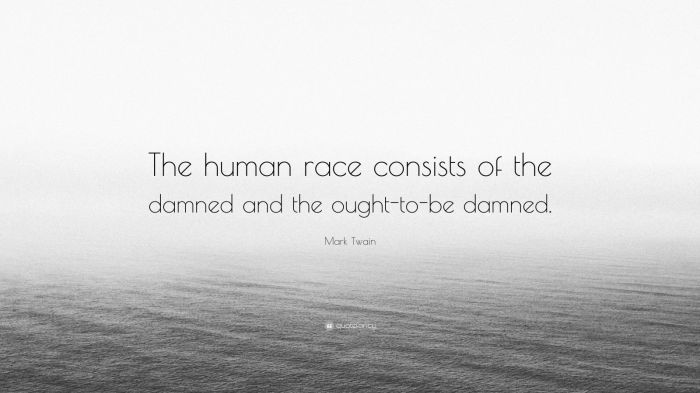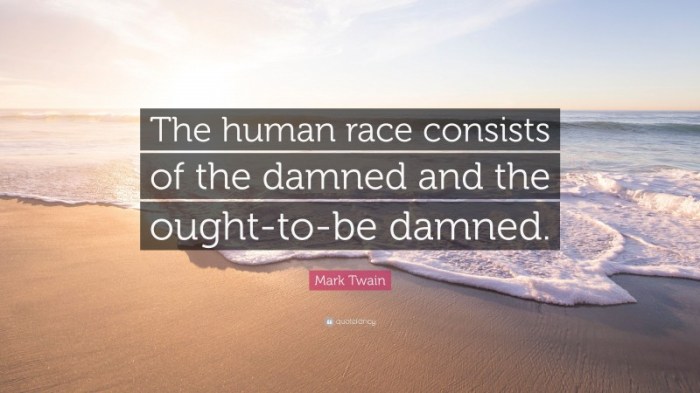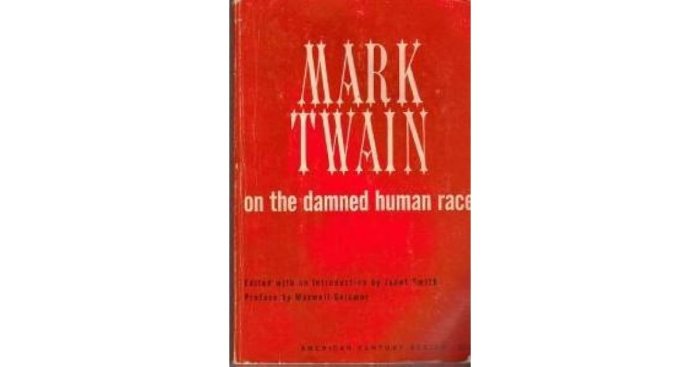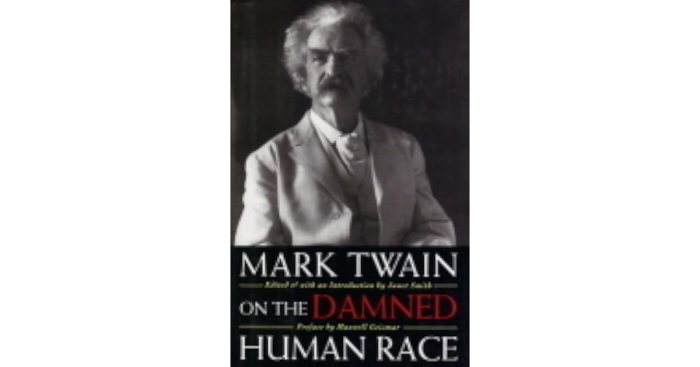Mark twain the damned human race – Mark Twain’s “The Damned Human Race” stands as a timeless masterpiece of satire, offering a scathing critique of human nature and the relentless pursuit of meaning in a chaotic world.
Twain’s sharp wit and keen observations on the human condition have resonated with generations of readers, leaving an indelible mark on American literature and beyond.
The Context of “The Damned Human Race”

Mark Twain’s “The Damned Human Race” was written in 1901, a time of great social and political upheaval. The Industrial Revolution had led to widespread economic inequality and the rise of monopolies, while the rise of imperialism had created a climate of racial and cultural tension.
Twain’s work was a product of this tumultuous era, reflecting his deep skepticism about the progress of human civilization.
Twain’s satire was a powerful tool for exposing the hypocrisy and folly of his time. He believed that humanity was fundamentally flawed and that progress was impossible without a radical change in human nature.
Satire in Twain’s Work
Twain’s satire was often biting and merciless, but it was always rooted in a deep understanding of human nature. He saw that humans were capable of great cruelty and selfishness, but he also believed that they were capable of great love and compassion.
His work was a complex and nuanced exploration of the human condition, and it continues to resonate with readers today.
The Impact of Technology on Humanity

Mark Twain’s “The Damned Human Race” offers a scathing critique of human nature, exploring the ways in which technology has both advanced and hindered our progress. Twain believed that technology had the potential to elevate humanity but that we had ultimately used it for destructive purposes.
Technology’s Role in Human Advancement
Twain acknowledged that technology had brought about significant advancements in human society. He praised the development of printing, which had made knowledge more accessible to the masses. He also recognized the transformative power of the telegraph and the telephone, which had facilitated communication and connected people across vast distances.
Technology’s Corrupting Influence
However, Twain was equally critical of the negative effects of technology. He believed that the pursuit of technological progress had become an obsession, leading us to neglect our moral and spiritual values. He argued that the invention of weapons of mass destruction had made war more devastating than ever before.
Twain’s Insights in Contemporary Context
Twain’s insights about the impact of technology resonate strongly with contemporary concerns. Today, we face similar challenges as those identified by Twain. The proliferation of social media has raised questions about the impact of technology on human interaction and mental health.
The rise of artificial intelligence and automation has sparked fears about the displacement of human workers.
Twain’s writings remind us that technology is a double-edged sword. It has the potential to improve our lives, but it can also be used for destructive purposes. It is up to us to use technology wisely and to ensure that it serves the greater good of humanity.
The Search for Meaning and Purpose

Twain’s “The Damned Human Race” delves into the profound human quest for meaning and purpose in life. His exploration of this theme is deeply rooted in his personal experiences and beliefs, particularly his disillusionment with organized religion and his skepticism towards human nature.
Twain believed that the human search for meaning was often futile, as humans are inherently flawed and prone to self-deception. He argued that humans often seek solace in external sources, such as religion or material possessions, but these ultimately fail to provide lasting fulfillment.
Twain’s Personal Experiences, Mark twain the damned human race
Twain’s own life experiences significantly shaped his perspective on the search for meaning. His childhood was marked by tragedy and loss, including the death of his father and brother. These events instilled in him a deep sense of mortality and the fragility of human existence.
Twain’s travels around the world also exposed him to different cultures and religions, further eroding his faith in any one belief system. He witnessed firsthand the hypocrisy and corruption that often accompanied organized religion.
Existential Themes
“The Damned Human Race” is replete with existential themes, exploring the fundamental questions of human existence. Twain grapples with the concepts of free will, the nature of good and evil, and the inevitability of death.
Twain suggests that humans are not inherently good or evil, but rather a complex mixture of both. He argues that our actions are often driven by self-interest and a desire for pleasure, rather than any higher moral purpose.
The Legacy of “The Damned Human Race”: Mark Twain The Damned Human Race

Mark Twain’s “The Damned Human Race” has had a profound and lasting impact on literature, thought, and society. Twain’s searing critique of humanity’s shortcomings has resonated with readers for over a century, and his ideas continue to shape contemporary discussions about the nature of humanity and the direction of civilization.
Literary and Intellectual Impact
Twain’s essay has influenced numerous subsequent works of literature and thought. His critique of human nature has been echoed in the writings of authors such as George Orwell, Kurt Vonnegut, and Philip Roth. Twain’s ideas have also been influential in the development of social and political thought, particularly in the areas of anarchism and pacifism.
Relevance to Contemporary Society
Twain’s critique of humanity remains relevant to contemporary society. His observations about the dangers of technology, the corrosive effects of greed, and the folly of war are as pertinent today as they were when he wrote them. In an era of rapid technological change and heightened social and political tensions, Twain’s essay serves as a timely reminder of the challenges and pitfalls that humanity must confront.
Common Queries
What is the central theme of “The Damned Human Race”?
The central theme of “The Damned Human Race” is Twain’s critique of human nature and the futility of our search for meaning in a meaningless universe.
How does Twain use satire to convey his message?
Twain employs various satirical devices, such as irony, exaggeration, and absurdity, to highlight the contradictions and shortcomings of human behavior.
What is the significance of “The Damned Human Race” in American literature?
“The Damned Human Race” is considered a seminal work in American literature, influencing subsequent generations of writers with its incisive social commentary and philosophical depth.


